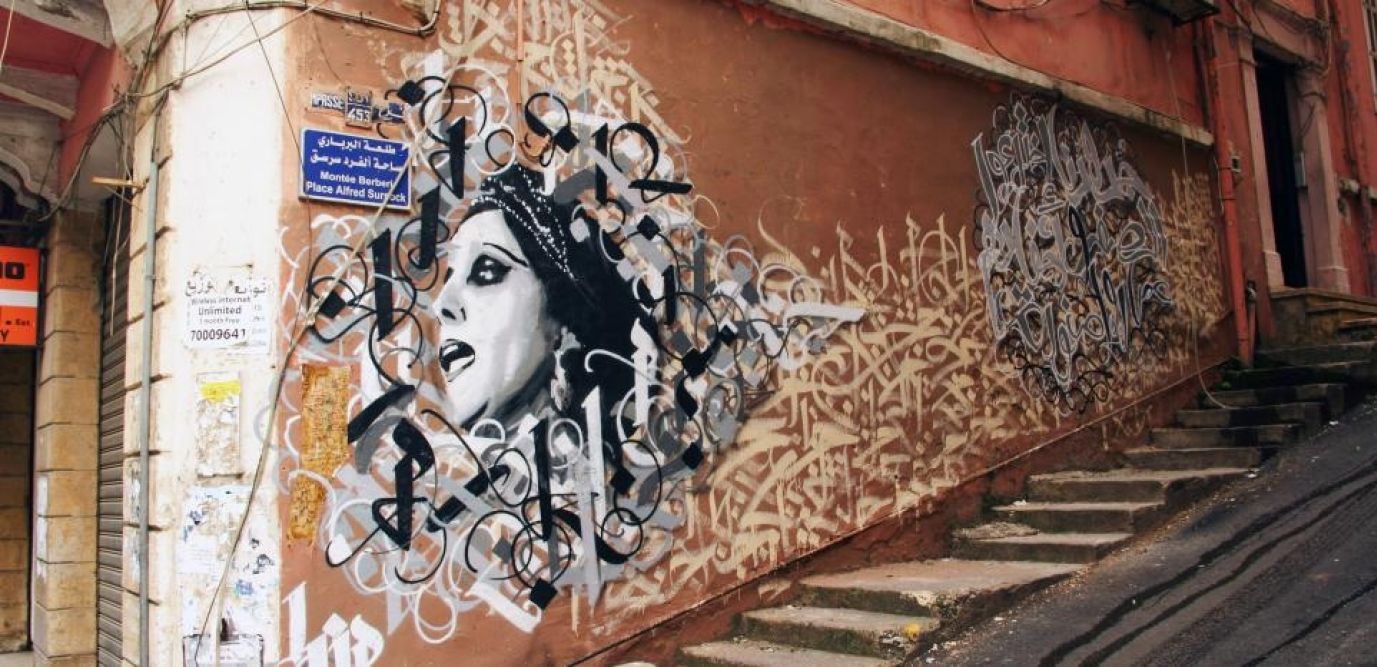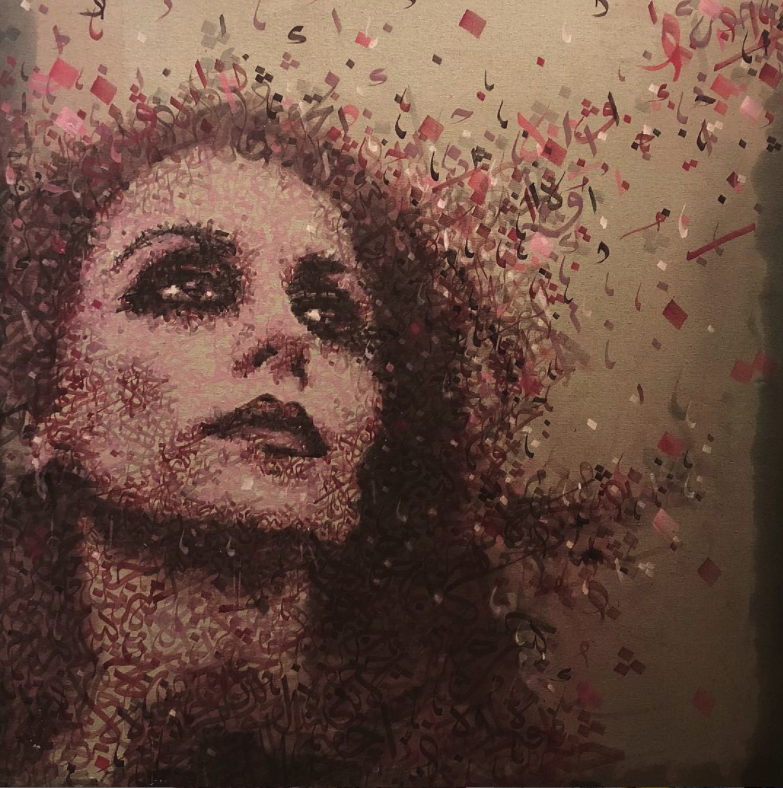
This is instalment six of Melissa Chemam’s monthly column, Music in the Middle East.
Melissa Chemam
Last month, while writing about Odesa and Beirut, I talked to a Franco-Lebanese friend who often shares with me his favorite music from back home. I wanted to hear about his months spent in Beirut, after years in Europe and Africa, and learn more about his experience of the daily difficulties of Beirutis. “Speaking of music,” Issam said, “I’m all about Fairouz these days, buying old vinyl records and listening to them with my mom. Listening to her music, I see her become very nostalgic, thinking about my father…”
Born in France in the late 1970s, he is nonetheless very attached to his family’s country of origin, despite the wars, political turmoil, and catastrophes. “My parents left Lebanon just before the civil war. They intended to return but the war stopped them.” They thus spent decades between France and Central Africa. In the 2010s, his parents finally returned to Beirut, but then his father passed away. And two years ago, his mother, Zahra, had a stroke.
“Since my mother’s been sick, she lost a lot of her memory,” Issam told me. “I came back to Lebanon to support her. And she plays Fairouz again, looking at the family’s old photographs. There is a lot she forgot but when we play the music, her memories come back…She starts feeling emotional and becomes herself again. We also listen to the Lebanese singer Walid Toufic and Syrian musician George Wassouf. The latter used to come to our Lebanese restaurant in Paris. But Fairouz is the one that triggers my mother the most. I can see the nostalgia in her eyes, as if she were rediscovering the song and reliving the moments…”
“She loves to listen especially to the live recording of Fairuz’s concert at Paris’ Olympia,” Issam continued, “with many French Lebanese attending in the hall. My mother went to that concert with my father. Then she starts telling me about those years, when I was a child. Every day, she can retell this story. For me, it’s like an endless day. It’s quite touching. The music has incredible power!”
I found Issam’s story so emotional that I imagined that many other families who had to leave their homeland because of wars and crises must have felt the same way. So I thought I would share Fairouz’s story with our readers and select a few songs with Issam.
Fairouz – “Habaytak Bisayf,” composed by the Rahbani brothers, performed in Paris in 1979
Fairouz Becomes Fairouz
The Lebanese singer was born Nouhad Wadie’ Haddad (in Arabic: نهاد وديع حداد) in Beirut on November 20, 1934, in a very modest Christian Lebanese family, that had recently left the mountains for the city.
She adopted her pseudonym 20 years later, Fairouz – also spelled Fairuz, Feyrouz or Fayrouz (in Arabic: فيروز), which means turquoise.
Many consider Fairouz one of the leading vocalists of the Arab world, among the greats of the 20th century.
She spent her childhood in the capital, punctuated by holidays with her grandmother in the mountains, where her family roots are and where she enjoyed the simplicity of the life in the village, deprived of electricity and running water.
She started listening to music from the neighbors’ radio. She memorized all the songs she heard, and particularly liked those of Farid al-Atrache and the legendary Arab stars of the 1940s, like the Egyptian singer Leila Murad and Syrian Druze vocalist Asmahan.
At school, her teachers encouraged her to study music. She was soon hired at the national Lebanese Radio Station in the chorus, in the late 1940s.
In July 1954, she married Assi Rahbani, and along with his brother Mansour they formed a trio. Together they began to dominate the music scene in the Arab world. As their voice, Fairouz soon met with critical and popular acclaim, from the 1950s to our time.
With the consequences of the Nakba for the region, displacing thousands of Palestinians to Lebanon, her music increasingly embodied for many the sound of a lost paradise… When in 1967 the Palestinians lost Jerusalem in a new war against Israel, Fairouz wrote the songs “Al Quds” and “Zahrat Al-Mada’en” (The Flower of Cities). She would rally many Arabs behind her sentimental lyrics.
During Lebanon’s 15-year-long civil war, which started in 1975, unlike many of her contemporaries, Fairouz didn’t leave her country. Her song, “Raji’e Lebanon” (Lebanon will be back) became a call to rebuild the war-ravaged country.
Issam’s family is originally from southern Lebanon, a region regularly attacked by the Israeli army. “At that time,” my friend told me, “Fairouz really became a figure representing the resistance of the Lebanese people, with her plays, musicals, songs…My mother listened to her every day in Paris, as our hero and patriot. And I listened along.”
The singer was very attached to her popular roots, and always refused to give private concerts for the powerful.
In Fairouz’s repertoire, both text and music are marked by innovation. With songs, operas, operettas, theatre, cinema, television, she and the Rahbani brothers worked in all the arts and gave concerts around the world. She has now reached the status of a cultural icon, in the Arabic-speaking world but also beyond.
Former Middle East editor at the Guardian, Ian Black, wrote in 2010 that Fairouz’s “crystalline voice” and her “haunting lyrics about love, life, Lebanon and Jerusalem” have made her “an icon second only to the legendary Egyptian singer Umm Kulthum.” Listening to her, especially live, many listeners have even mentioned feeling “ecstasy,” among them the Palestinian-Iraqi author Jabra Ibrahim Jabra.

In 2015, when she turned 80, the Amman based pan-Arabic website Al Bawaba headlined: “Iconic Fairouz remains most listened-to Arab singer.” And in 2016, the Dubai-based newspaper The National published an article titled “Eight reasons why Fairouz is the greatest Arab diva of all time.”
Last year, for the opening of the exhibition “Divas” at the Institute du Monde Arabe (IMA) in Paris, the director of the museum, Jack Lang, told the New York Times: “These women were not just exceptional vocalists. Some participated in their country’s struggle for independence from the colonial powers, Britain and France, and joined in a wave of nationalism that swept across the Arab world. The emergence of these divas coincided more or less with a time of collective emancipation. The music sung by them is an extraordinary expression of freedom.”
On her Facebook page, which has 5.8 million followers, a fan recently wrote that “there’s no one like you on earth,” while another called her a “Queen of art and beauty.” A third one added: “Fairouz is my life.”
Her last album was produced in 2010 and titled Eh Fi Amal (Yes, there is hope). In an interview from 2014, her eldest son, Ziad Rahbani, a composer, pianist, playwright, and political commentator, didn’t rule out a new one. Now 87 years old, her legacy continues at least with him, but millions of fans live in hope.
Others, especially in Beirut, like Issam and Zahra live in nostalgia, and — these days, with the bleak political and social climate — frankly, who could blame them?



